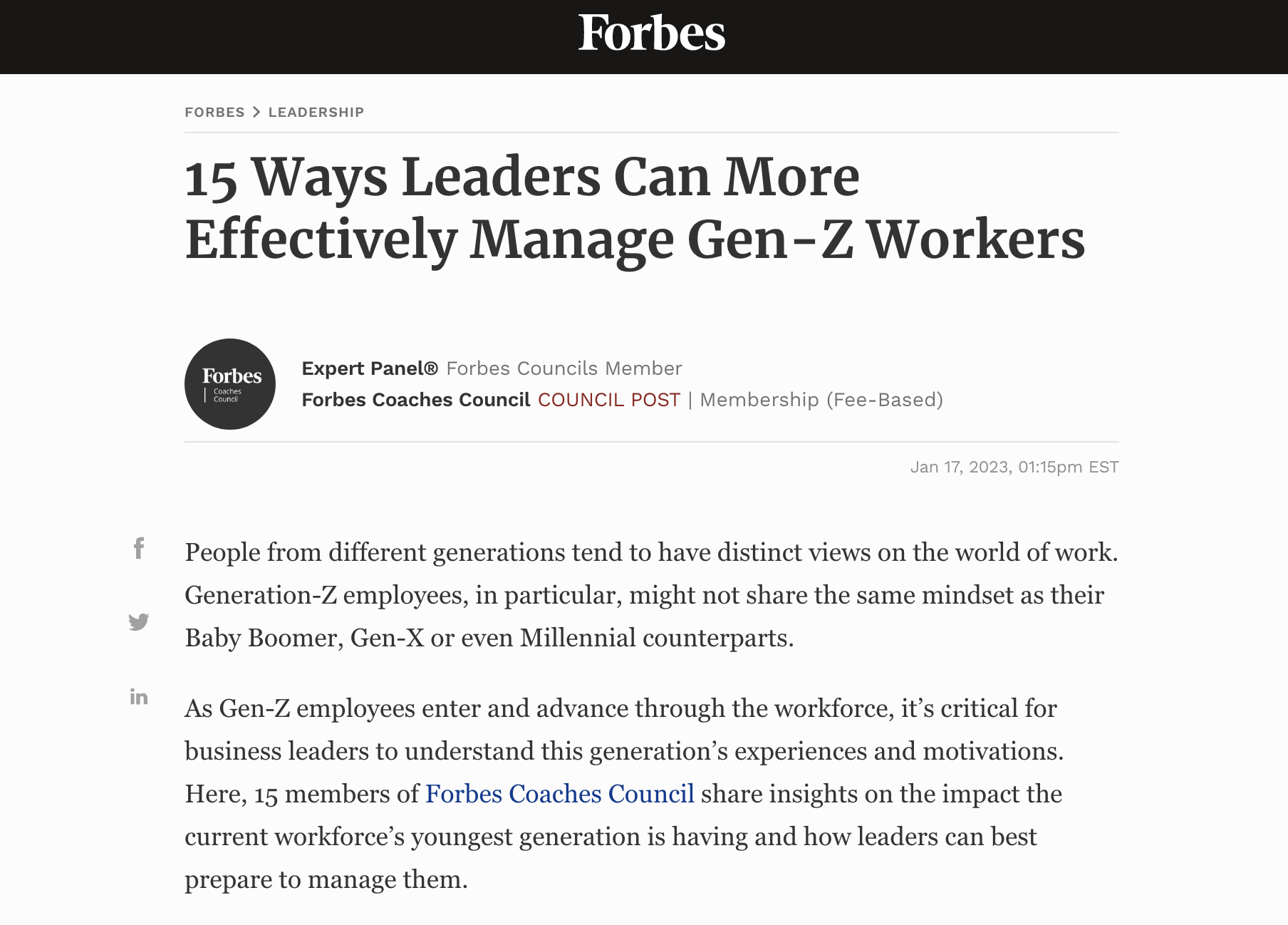People from different generations tend to have distinct views on the world of work. Generation-Z employees, in particular, might not share the same mindset as their Baby Boomer, Gen-X or even Millennial counterparts.
As Gen-Z employees enter and advance through the workforce, it’s critical for business leaders to understand this generation’s experiences and motivations. Here, 15 members of Forbes Coaches Council share insights on the impact the current workforce’s youngest generation is having and how leaders can best prepare to manage them.
1. Encourage Innovation And Work-Life Balance
As Gen-Z workers enter the workforce, expect to see innovation climb on a global scale. As a group, Generation-Z is more entrepreneurial, diversified, technologically savvy and individualistic than prior generations. Like the Millennials before them, Gen-Z employees treasure work-life balance and take care of their mental health in a way the Baby Boomers never learned to do. – Laura Rau, The Entrepreneur’s Source (TES)
2. Lead By Example
Gen-Z doesn’t like being told what to do and won’t simply obey like previous generations. Leading by example through vision and feedback is more important than ever. Hiring gets more important, too. Choose employees who want to work for you, then put them in positions where they see themselves having the most impact and where you know you can lead them to greatness. – Nick Geringer, Nick Geringer GmbH
3. Understand Their Needs
Generation-Z is the first generation to make demands for what they believe is important in the workplace. This includes wanting more—including prioritizing mental health, having flexibility with hours, getting more vacation time and not settling. Leaders should begin to understand Gen-Z employees’ needs by having an open dialogue, asking for feedback and reacting appropriately to avoid high levels of turnover. – Carmelina Piedra, CareerCoachingPro
4. Provide Growth Opportunities
Gen-Z employees generally view their work life as a way to learn, grow and develop and are not tied to one role or company. Leaders need to understand this mindset, then provide opportunities for their talent to continuously learn and be challenged with new experiences. Gen-Z workers also bring new and different perspectives to the workplace that leaders can learn from, so leaders can benefit from reverse mentoring. – Rochelle Cooper, Success Leaders
5. Leverage Gen-Z’s Desire For Change
Gen-Z will continue to challenge the status quo and command more of a voice and impact in the workplace. Leaders should recognize that Gen-Zers are not aliens from another planet (as they are often portrayed), but rather are a collective catalyst for change that can be leveraged to drive strategic and cultural change. Leaders who fail to harness the power of Gen-Z are placing their organizations at a disadvantage. – Cathy Lanzalaco, Inspire Careers LLC
6. Focus On The Individual
It is easy to stereotype different generations, but focusing on the individual and what motivates and inspires them is the best path forward. Knowing that Gen-Z workers are motivated by feeling valued, contributing and making change where it matters, leaders should tie efforts to impact, reinforce their appreciation and consider small investments in development to keep the team moving forward. – Tami Chapek, WeInspireWe
7. Be Open To Learning From Them
Gen-Z is distinct in their comfort with technology. They were born with it and have an innate ease with which they interact with both the information and the “connectivity” that tech can foster. They view the world as a place that is equally accessible, and they bring big, new ideas! Leaders need to have curiosity and an openness to learning from them, just as they will learn from the current leaders. – Sohee Jun, S.J. Consulting, LLC
8. Walk The Culture Talk
Gen-Z doesn’t tolerate toxic cultures, discrimination, misalignment between the words and actions of management, or work that won’t flex to fit their personal lives. Leaders need to have conversations with all team members to establish a safe work culture and align expectations and commitments, and they need to walk the culture talk. Gen-Z doesn’t care what you know until they know that you care. – Christine Rose, CEOAccel
9. Lead With Humanity
Being nice is not enough for future leaders to be effective and chosen by Gen-Z employees. It’s all about leadership, innovation and change-making. It’s all about purpose and sense-making. Humanity must lead the future of leadership because new generations are looking for social connections, independence, flexibility and balance. – Kalina Terzieva, My Coaching Brain
10. Invest In Them Early
Gen-Z workers are better equipped to thrive in a hybrid work environment, having been forced to be more versatile and adaptable early in their careers. With a shifting workplace narrative that is calling more loudly for purpose-driven leadership, Gen-Z employees will have to be bold, courageous and human-centric. Leaders today need to invest earlier on in equipping them and preparing to be managed by them. – Elisa Mallis, Center for Creative Leadership
11. Foster A Supportive Environment
Generation-Z has challenged norms in the traditional workplace by being open and honest about their own requirements. Leaders can prepare to manage this dynamic generation by getting to know them and understanding their needs, then fostering a supportive environment for them to thrive and be productive, thereby building trust. Otherwise, they will create their own opportunities to thrive and grow! – Tinna Jackson, Jackson Consulting Group, LLC
12. Understand Work As A Part Of Life
The value of work is changing as new generations enter the workplace. Work is seen as part of life, and employers need to understand the impact of this mindset. It can include increased flexibility of the work, different employee benefits than in the past, increased focus on purpose in work and company impact on the world. – Evan Roth, Roth Consultancy International, LLC.
13. Have Check-Ins And Clear Expectations
Leaders should prepare to manage Gen-Z through outcomes. They are motivated differently and work differently from previous generations, but they will get the job done. Leaders need to set clear expectations for deliverables and have check-ins. One-on-one weekly meetings will ensure that they are on the right track and will provide coaching moments. This is perhaps a model for other generations, too. – Jill Helmer, Jill Helmer Consulting
14. Be Flexible In Your Management Style
Leaders should take note and prepare to manage Gen-Z workers by understanding their values and being flexible in their management style. Gen-Z workers are more likely to stay with companies that offer them meaningful work, ownership of tasks and a sense of belonging. Companies should focus on developing workplace cultures that support these qualities to attract and retain Gen-Z talent. – Anna Tan, Coaching Go Where
15. Promote More Open Communication
Gen-Z workers are looking for purpose and alignment over many of the other motivational factors many leaders are used to. The opportunity lies in the fact that they are more attuned to their own needs, so this means you will have honest and open conversations. You can use this example to give other employees permission to speak up more, too! Be aware of your own bias that Gen-Z behaviors may trigger in you as a leader. – Sarah Needham, Unique-U Coaching


